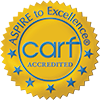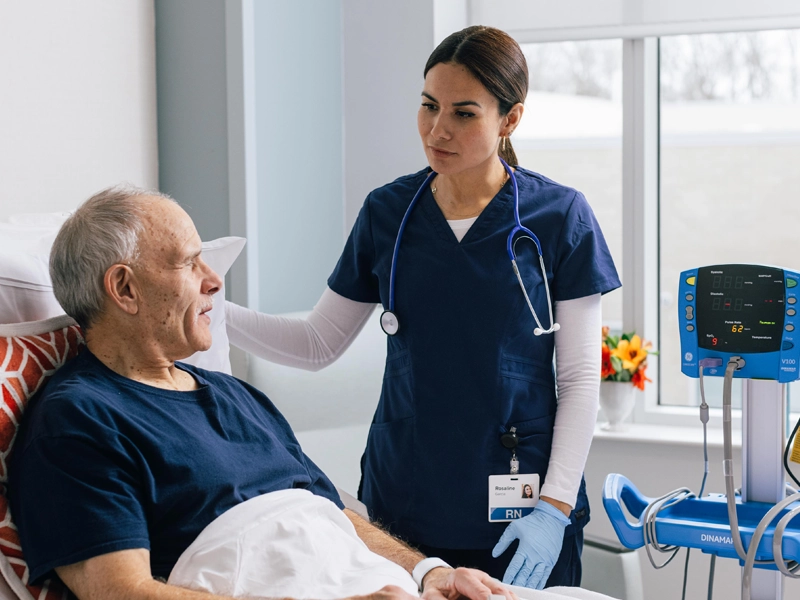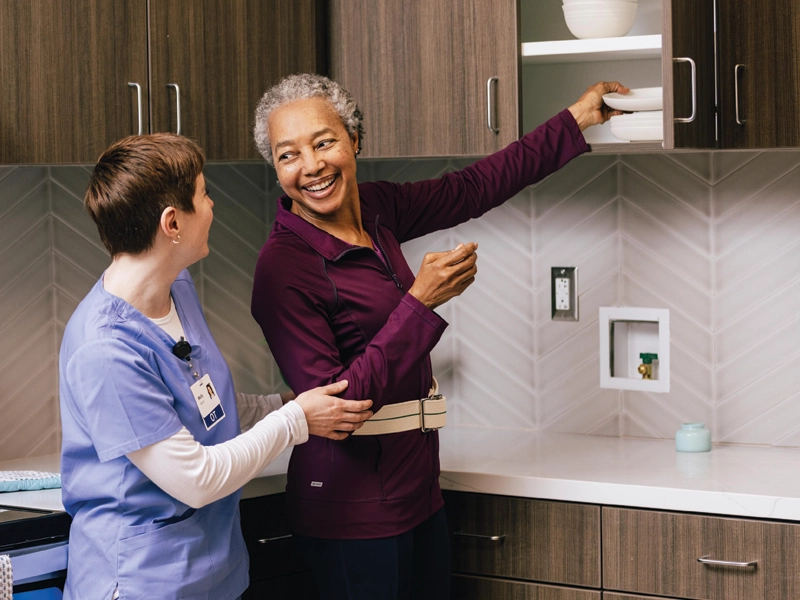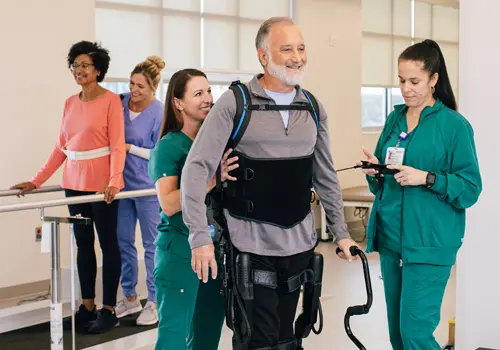Stroke Rehabilitation
When you experience a stroke, you can be impacted both physically and psychologically. Let our team of highly trained rehab professionals assist you throughout your recovery journey so you can get back to doing what you love.
Why Choose Us for Stroke Rehabilitation
Our Stroke Program is comprised of an experienced team of professionals who provide specialty care to help individuals regain function from the physical and psychological effects following a stroke. Through individualized therapy, our team is committed to providing the most complete and optimal recovery possible.
Elements of the Stroke Program include, but are not limited to:
- Prevention, recognition, assessment, and treatment of conditions related to stroke and its complications
- Conditions may include bowel and bladder dysfunction, anxiety, depression, deconditioning, dysphagia, emotional lability, falls, blood pressure problems, pressure ulcers, and recurrent stroke
To help patients regain the most function possible after a stroke, our interdisciplinary team works to implement a treatment plan designed to maximize potential and complement medical interventions by providing an interdisciplinary team approach to care.

Our Stroke Specialty Program is certified by The Commission on Accreditation of Rehabilitation Facilities (CARF)
Inpatient Rehabilitation Plays an Important Role in Stroke Recovery
We are dedicated to providing expert and compassionate care for recovery after a stroke.
Early action is critical when a patient suffers a stroke. Stroke rehabilitation should begin as soon as possible after a stroke once a patient’s medical condition is stable and doctors have taken preventive measures against further strokes and complications.
 Our intensive inpatient program provides a personalized treatment plan for each patient and ongoing care with the goal of preparing people to return home independently or with assistance from family members or other care providers.
Our intensive inpatient program provides a personalized treatment plan for each patient and ongoing care with the goal of preparing people to return home independently or with assistance from family members or other care providers.
Research shows that inpatient rehabilitation results in:
- Going home quickly
- Short lengths of stay
- Minimizing hospital readmission
American Stroke Association (ASA) Guidelines
Key recommendations from the ASA’s Adult Stroke Rehabilitation and Recovery Guidelines provide the best clinical practices for adults recovering from stroke. First and foremost, the guidelines state that whenever possible, recovery should happen in an acute inpatient rehabilitation setting over a skilled nursing facility (SNF).
The guidelines suggest there is strong evidence that organized, interdisciplinary stroke care – such as that provided by an Inpatient Rehabilitation Facility (IRF) – not only reduces mortality rates and the likelihood of institutional care and long-term disability but also enhances recovery and increases independence in activities of daily living. To this end, all patients who may qualify should be evaluated by IRF clinicians so the proper level of care for each patient may be pursued. According to the guidelines themselves, “the consistency of the findings in favor of IRF referral suggests that stroke survivors who qualify for IRF services should receive this care in preference to SNF-based care.”
Every patient is treated with dignity, respect and compassion. Patients admitted to an IRF benefit from individualized therapy and nursing care for medical and functional needs that should prevent them from going to a less intense level of care.
Our Stroke Program helps improve skills by focusing on:
- Maximizing your independence, health and mobility
- Daily activities of living such as eating, dressing, grooming, bathing, and homemaking
- Bowel and bladder management
- Communication through speaking and writing
- Swallowing
- Improving memory and judgment
- Speech and language
- Balance and coordination
- Psychological adjustment
- Self-image
Treatment delivery and intensity of service are determined as part of the individualized plan of care and will typically include a combination of 30- to 60-minute therapy sessions for three or more hours most days.
The Therapy Team
The patient, patient’s family, loved ones and caregivers are the most important part of our rehabilitation team. Our team of health professionals will work together with the patient and the patient’s caregivers toward recovery from a stroke.
Our interdisciplinary rehabilitation team specializing in stroke rehabilitation includes:

- Daily oversight by a physician specializing in rehabilitation
- Rehabilitation nurses
- Physical therapists who work on problems with movement, walking, balance and coordination
- Occupational therapists who help patients regain independence with eating, bathing, dressing, writing and other daily tasks
- Certified speech therapists who help patients recover speech, language, cognitive and swallowing skills
- Orthotic/adaptive equipment specialists
- Nutritional counselors
- Case managers/social workers
- Neuro/clinical psychologists

The EksoGTTM exoskeletal unit assists patients with early ambulation following a stroke or spinal cord injury.
Caregiver Support
Since family is often an important part of the recovery process, the rehab staff provides stroke education and training to close family members.
A social worker, nurse or case manager will help the patient and his or her caregivers arrange for the help and equipment that will be needed at home after treatment. Other activities may include stroke education classes as well as a stroke support group.
Education and Discharge Planning
It’s important for the patient and family to receive instruction in many areas to help facilitate the readjustment to a fulfilling lifestyle. The case manager will assist with the needs of the patient after the rehabilitation journey has been completed by making the necessary arrangements for equipment, outpatient services, and home services.
A few topics of discussion at discharge may include:
- Understanding the medical, physical, and emotional effects of stroke
- Nutrition
- The adjustment to disability
- The availability and use of adaptive equipment
- Equipment maintenance
- Community resources
- Community reintegration
- Orthotics use and practice


